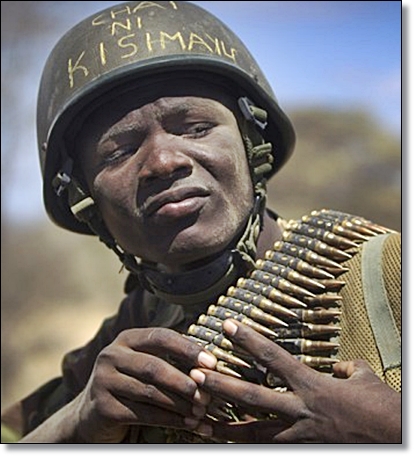Africa: Security is Everybody’s Business

 |
| A soldier deployed by AU in Somalia |
Illegal Armed militia groups, rebel groups, terrorist groups, violent, intolerant, Religious, ethnic and political extremist groups and transnational organized criminals, are roaming the continent and actively challenging and hindering our quest for peace and stability, preconditions for any meaningful and sustainable economic, social and human development.
While most of these sources of instability can be said to be home grown or inspired by developments inside our own countries, there is evidence of growing interference of external factors which exploit our internal limitations to fuel dissent and promote violence and instability.
Terrorism remains a major security threat on the Continent and is likely to be so for a long time to come. The Prevention and fight against terrorism is a complex and multifaceted endeavour. There is no war front in this war. The frontline is anywhere, everywhere, anytime; The continent is home to a large number of terrorist groups of which AQMI, MUJAO, BOKO HARAM, ALSHABAAB, ANSARU, AL MOURABITOUN, ANSARDINE, LRA, ADF/NALU, ANSAR SHARIA, ANSAR BEIT AL MAQDIS (partisan de Jerusalem) and AJNAD MISR (Soldat d’Egypte) are just the most resounding names. A group claiming to be soldiers of the Califa of the so called Islamic State has made its presence known through an unspeakable beheading of a French Citizen in Algeria.
Terrorists, transnational organized criminals and insurgent groups on the continent have acquired the capacity to wage both conventional and asymmetric warfare against governments and relentlessly strive to snatch and secure chunks of national territory to create a state within the state, with the aim of eventually overpowering the central government. They master the networking techniques and are very knowledgeable about the zone, terrain and topography of the region they operate in. They have the ability to develop a tight and complex relationship with local banditry groups and international organized criminality. They adopt modern technologies to communicate, mobilize, recruit, radicalize, finance and implement their strategy.
Facts of everyday life are insistently pointing to the absolute need to move beyond the present short term "ad hoc" and reactive security and counter-terrorism measures and adopt medium to long term holistic approaches which, by necessity, must have a multi-stakeholder involvement.
Security today can no longer be seen as the specialty of classical intelligence and security forces alone. Security is everybody's business and we must fast take measures to reflect this reality in our daily fight against instability. The APSA has long come to this conclusion and it is deeply embedded in the efforts for its operationalization.
Only this way, together with better coordination, improved cooperation and a complementary and concomitant deployment of preventive economic, political, diplomatic and counter radicalization programmes, all backed up by good intelligence, effective law enforcement and the use of robust military force where necessary, we can vanquish insecurity and terrorism and restore peace on the continent.
The world has shrunk and the fast growing technological advancements have made it a global village. Africa, Asia America and Australasia are no longer far apart. The reality of our interdependency is ever more evident. The need for each other for safety, survival and prosperity is undisputable. We are now trading with each other more than ever before. Our citizens are visiting each other more frequently, faster and more easily. We have investments and other vital interests in each other’s countries and regions. Developments anywhere on the continent can have and normally do have repercussions beyond our own continental borders.
Acts of war and violence can target our interests at home or anywhere they might be on the continent. They can be conceived in one country, planned in another, and perpetrated against our interests in a third country, continent or wherever they might be in the world. China and the rest of the World have interest to join hands with us to keep the continent safe and free of violence, not just for humanitarian reasons, but also for the good of our own countries, our own economies and our own citizens.
In this joint effort, because
of past historical relations characterized by absence of colonial domination, unconditional support to the efforts for national liberation of our countries and readiness to continue to support the continent in its quest for progress, economic emancipation and infrastructural development on a win- win approach, China-Africa interaction has positively increased at a very rapid pace in the recent years. This gives China a relative competitive advantage over other stakeholders.
By H.E. Ambassador Francisco Caetano José Madeira,
AU Chairpersons’ Special Representative for Counterterrorism Cooperation; Director of the African Centre for the Study and Research on Terrorism (ACSRT).
